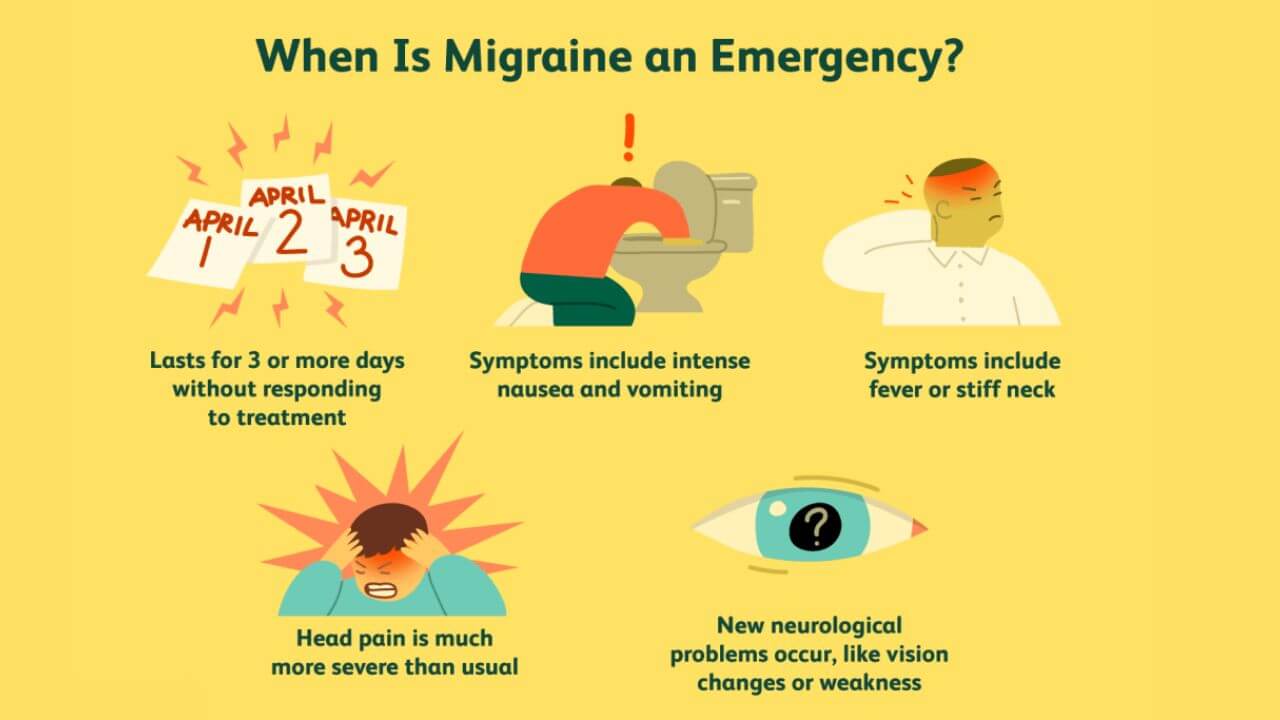When to Go to Urgent Care for Migraine: Visit urgent care for a migraine if you experience severe symptoms that don’t respond to home treatment or if it’s your worst headache ever. Seek immediate care if your migraine includes confusion, fever, or stiff neck.
Migraines can be debilitating, and understanding when to seek urgent care is crucial. These intense headaches often come with nausea, sensitivity to light or sound, and a throbbing pain that can disrupt your daily life. While many individuals manage their migraines at home, certain situations warrant professional medical attention.
Recognizing the signs that indicate the need for urgent care can ensure you get the appropriate treatment swiftly, potentially averting more severe health issues. This guide will help you discern when a migraine is more than a headache and requires urgent medical intervention. Remember, your health is paramount; getting timely help could make all the difference in your recovery and well-being.
Recognizing Migraine Symptoms
Recognizing migraine symptoms is crucial for timely care. Not all headaches warrant urgent care, but migraines can be an exception. Understanding when a migraine is more than a headache helps determine when to seek medical attention.
Common Migraine Indicators
Migraines often bring a unique set of symptoms. Look out for these signs:
- A throbbing headache on one side
- Sensitivity to light and sound, causing discomfort
- Nausea or vomiting, impacting daily activities
- Visual disturbances, known as aura
- Dizziness or a feeling of being unsteady
Atypical Migraine Presentations
Sometimes, migraines can appear differently. Note these less common symptoms:
- Abdominal pain that may not be related to other causes
- Yawning frequently, even when not tired
- Sudden mood changes, from happy to sad without reason
- Numbness or tingling in the extremities or face
- Difficulty speaking, finding words or forming sentences

Credit: www.holzer.org
Differentiating Migraine From Other Headaches
Knowing when a headache is just a passing pain or a sign of something more serious is vital for proper care. Migraines often get mistaken for other types of headaches. Recognizing the difference can determine if urgent care is necessary.
Tension Vs. Migraine Headaches
Migraine headaches are intense and throbbing. They often come with nausea, vomiting, and sensitivity to light or sound. Headache tension is similar to having a tight band around your head. They cause a dull, aching pain that is more annoying than disabling.
- Duration: Migraines last 4 to 72 hours, and tension headaches can persist for days.
- Intensity: Migraines are often severe; tension headaches are usually mild to moderate.
- Location: Migraines typically affect one side, and tension headaches cover the whole head.
Cluster Headaches And Migraines
Cluster headaches are rare but excruciating. They occur in cyclical patterns or clusters. Migraines, on the other hand, come less frequently but can be just as intense.
| Feature | Cluster Headache | Migraine |
|---|---|---|
| Time | Short bursts, often at the same time each day | It may continue for several hours or days. |
| Pain Type | Sharp, piercing pain around one eye | Throbbing pain, usually on one side of the head |
| Symptoms | Watery eye, nasal congestion on one side | Nausea, light, and sound sensitivity |
Migraine Triggers And Management
Migraines can feel like uninvited guests that disrupt your day. It’s important to know when to get emergency care. Understanding triggers and managing symptoms can help. This section explores common causes and effective home strategies.
Identifying Personal Triggers
Triggers vary from person to person. Typical ones include eating particular foods, sleeping too little, and stress. Tracking your migraines can help identify your triggers. Consider keeping a migraine diary. Note what you ate, your stress levels, and your sleep quality before an attack. This data can reveal patterns.
Home Remedies And Preventive Measures
Several strategies can reduce migraine frequency and severity. Try these at home:
- Stay hydrated: Drink plenty of water throughout the day.
- Maintain a regular sleep schedule: Aim for 7-9 hours each night.
- Exercise regularly: Activities like yoga and walking can reduce stress.
- Limit trigger foods: Avoid chocolate, cheese, and processed meats if they cause issues.
- Relaxation techniques: Practice deep breathing or meditation to manage stress.
Medications can also play a role in prevention. Speak with a healthcare provider about options. If migraines persist or worsen, consider visiting an urgent care center.
When To Seek Urgent Care For Migraine
Understanding when to seek urgent care for a migraine is critical to managing your health effectively. Migraines can be just annoying or genuinely debilitating. It’s crucial to know when professional help is needed.
Severe Pain That Won’t Subside
Intense migraine pain that does not improve even after rest and hydration is a red flag. Such pain can disrupt daily activities and require medical attention to ensure it isn’t something more serious.
- Throbbing, persistent headache that lasts for more than 48 hours.
- Signs include nausea, dizziness, and extreme sensitivity to light or sound.
- Seek urgent care if pain escalates quickly and becomes unbearable.
When Over-the-counter Medications Fail
If regular medicines do not ease your migraine, it might be time to visit urgent care. This indicates your migraine needs more potent treatment.
| Medication Type | Effectiveness |
|---|---|
| Over-the-counter pain relievers | Not effective |
| Prescription migraine medicine | Potentially required |
Watch for worsening symptoms such as vision problems or loss of balance. These symptoms suggest that immediate medical care is necessary.
Critical Signs Requiring Immediate Attention
Recognizing the critical signs that necessitate immediate medical attention is vital when experiencing a migraine. While most migraines are not emergencies, specific symptoms can indicate more severe conditions like a stroke or aneurysm. Knowing when to seek urgent care can be life-saving.
Symptoms Of Stroke Or Aneurysm
If specific symptoms accompany a migraine, it could signal a stroke or aneurysm. These are medical emergencies. Urgent care is essential. Look for these critical signs:
- Sudden numbness or weakness in the face, arm, or leg, especially on one side of the body.
- Confusion, trouble speaking, or difficulty understanding speech.
- Trouble seeing in one or both eyes.
- Walking difficulties, lightheadedness, unsteadiness, or lack of coordination.
- Severe headache with no known cause.
Sudden Onset Of ‘the Worst Headache’
A sudden, severe headache, often described as “the worst headache of my life,” can be a warning sign of a brain aneurysm. This kind of headache needs to be treated by a doctor very away. Symptoms may include:
| Symptom | Description |
|---|---|
| Sharp, Sudden Pain | Intense headache that peaks within seconds to minutes. |
| Neck Stiffness | Pain when moving the neck or inability to touch the chin to the chest. |
| Seizures | Sudden, uncontrolled electrical disturbances in the brain. |
| Blurred Vision | Difficulty focusing or double vision. |
| Nausea or Vomiting | Especially when combined with other symptoms. |
Don’t wait to seek help if you experience any of these symptoms. Reach out to urgent care or call emergency services immediately.

Credit: www.cornerstoneuc.com
Navigating Urgent Care For Migraine
Knowing when to seek urgent care for a migraine can be a lifeline for sufferers. Migraines can escalate quickly, and urgent care centers provide timely treatment. This section guides you through what to expect and what information to provide at urgent care.
What To Expect At Urgent Care
At urgent care, patients with severe migraines can expect prompt attention. Clinicians will assess symptoms and may administer medication to alleviate pain. If necessary, they might also conduct diagnostic procedures.
- Short wait times
- Medical assessment
- Treatment with pain relief
- Potential diagnostic tests
Essential Information To Provide
Providing detailed information helps clinicians offer the best care. Mention previous migraine episodes, current medications, and any known triggers. Accurate therapy depends on these data.
| Information Type | Details to Include |
|---|---|
| Migraine History | Frequency, duration, symptoms |
| Current Medications | All prescriptions, OTC drugs, supplements |
| Known Triggers | Food, environment, stress |
Post-urgent Care: Follow-up Care And Prevention
After visiting urgent care for a migraine, proper follow-up care is crucial. This ensures the migraine is managed effectively and future episodes are minimized. Here’s how to handle post-urgent care for migraines:
Scheduling Follow-up With A Specialist
Setting up a follow-up appointment with a headache specialist is vital. This helps you understand your migraine triggers and evaluate the effectiveness of the treatment received at urgent care. Consider these steps:
- Book an appointment within a week after your urgent care visit.
- Prepare to discuss the frequency and intensity of your migraines.
- Keep a headache diary and bring it to your specialist.
Long-term Prevention Strategies
To reduce the frequency and severity of migraines, adopt these prevention strategies:
| Strategy | Description | Frequency |
|---|---|---|
| Medication | Use prescribed preventive medications. | Daily |
| Lifestyle Changes | Avoid known triggers like stress or certain foods. | As needed |
| Regular Exercise | Engage in activities like walking or yoga. | 3-5 times a week |
Implementing these strategies can help you manage your migraines better and reduce your visits to urgent care.
Understanding Urgent Care Limitations
Understanding Urgent Care Limitations is vital for anyone suffering from migraines. Urgent Care centers offer quick medical attention. However, they may not always be the best choice for migraine treatment. Knowing when to visit Urgent Care and when to seek more specialized care can save time and lead to better health outcomes.
When To Consider The Emergency Room
Intense, sudden migraine attacks might need more care than Urgent Care can provide. Look for these signs:
- Worst headache ever
- Headache with confusion or difficulty speaking
- Sudden vision loss or double vision
- Seizure or loss of consciousness
- Headache after a head injury
- Uncontrollable vomiting
Visit the emergency room right away if you encounter any of these. They have tools and teams to deal with severe conditions.
Limitations Of Urgent Care For Chronic Migraine
Urgent Care is not the best place for chronic migraine management. Here’s why:
| Urgent Care Limitation | Reason |
|---|---|
| Lack of Specialized Care | Migraine specialists are not available |
| Short-Term Treatment | Focus on immediate relief, not long-term management |
| No Custom Treatment Plans | It does not offer tailored migraine plans |
| Limited Testing | Cannot perform comprehensive diagnostic tests |
For ongoing migraine issues, see a neurologist or headache specialist. They create treatment plans that prevent and manage chronic migraines.
Insurance And Cost Considerations
Understanding insurance and costs is critical when seeking urgent care for migraines. These factors can impact your decision on where and when to get help.
Navigating Insurance For Urgent Care Visits
Insurance policies vary widely, so knowing your coverage is essential. Start by checking if the urgent care center is in-network. This means lower costs for you. Always carry your insurance card and know your copay for urgent care visits.
- Confirm coverage – Call your insurance or check online.
- Understand your plan – Know your deductible and out-of-pocket maximum.
- Pre-authorization – Some plans require this before your visit.
Cost-effective Care For Migraine
Urgent care is often less expensive than emergency rooms. For migraines, urgent care provides fast, affordable treatment. Consider generic medications to save money.
| Service | Urgent Care | Emergency Room |
|---|---|---|
| Basic Consultation | $100 – $200 | $500 – $1000 |
| Medication | Lower-cost generics available | Higher cost name-brands common |
Save on treatment by asking about cash discounts or payment plans. Many urgent care centers offer these options to make care more affordable.
Alternative Options For Migraine Relief
Migraines can be more than just a headache; they can impact daily life significantly. While urgent care is an option for severe cases, alternative relief methods are available. These approaches may help manage migraine symptoms effectively.
Telemedicine For Migraine Management
Telemedicine provides convenient access to healthcare professionals. Migraine sufferers can receive medical advice, prescription refills, and ongoing support from home. This service benefits those experiencing migraines with symptoms that make it difficult to travel.
- Video consultations save time and reduce the need to travel.
- Direct chat options allow for quick questions and updates.
- Prescription delivery services ensure medications are readily available.
Integrative Medicine Approaches
Integrative medicine combines traditional treatments with alternative therapies. This holistic approach can include a variety of non-pharmaceutical methods. Below are some integrative strategies that may offer relief:
| Approach | Description | Benefits |
|---|---|---|
| Acupuncture | Stimulation of specific body points with needles | Reduces frequency and intensity of migraines |
| Massage therapy | Manual manipulation of soft body tissues | Relieves muscle tension and stress |
| Mindfulness meditation | The practice of being fully present and engaged | Improves coping mechanisms for pain |
| Yoga | Combines physical postures, breathing exercises, and meditation | Enhances relaxation and overall well-being |
Remember, these alternative options should be discussed with a healthcare provider to ensure they complement your existing migraine treatment plan.

Credit: www.carenow.com
Frequently Asked Questions
When to Go to Urgent Care for Migraine:
Can Urgent Care Do Anything For Migraines?
Yes, urgent care can provide treatment for migraines, including medication for pain relief and anti-nausea drugs.
At What Point Should I Be Concerned About A Migraine?
Seek medical attention for a migraine if you experience sudden, severe headache pain, visual disturbances, difficulty speaking, or weakness in your arms or legs.
When Is A Migraine Bad Enough To Go To The ER?
Visit the ER for a migraine if you experience severe symptoms such as sudden onset, vision loss, confusion, or fever. Seek immediate attention for headaches following injury.
How Long Is Too Long For A Migraine?
Most migraines last between 4 and 72 hours. If your migraine persists for over 72 hours, consult a healthcare professional. This condition is known as status migrainosus and may require medical intervention.
Conclusion
Deciding to visit urgent care for a migraine can be crucial for relief. Recognize severe symptoms and don’t hesitate to seek help. Urgent care provides effective treatment when your usual methods fail. Remember, managing your health proactively is critical to reducing migraine-related disruptions.

Hello there! I’m here to assist you with health tips and tricks. Whether you’re looking to boost your energy, improve your sleep, or enhance your overall well-being, I’m here to guide you with strategies and frameworks that can empower you to make positive changes.
First and foremost, it’s important to understand that health is a holistic concept encompassing various aspects of physical, mental, and emotional well-being.

